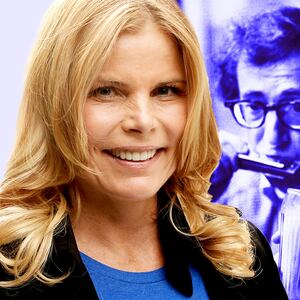In the whirlpool of discourse about movie theater openings, an unprecedented award season, and the impact of pandemic-motivated streaming and on-demand releases on the future of the film industry, something has gone noticeably, well... unnoticed. A new Woody Allen movie dropped today.
A Rainy Day in New York stars Timothée Chalamet, Elle Fanning, Selena Gomez, Jude Law, and Liev Schreiber—an eclectic, yet star-studded cast—and follows Chalamet’s character (named, I kid you not, Gatsby Welles) as he travels to New York City to stage a romantic weekend for his long-distance girlfriend (Fanning). Plans are thwarted as the two get carried away in a tangle of artistic and familial misadventures. It rains.
The film itself is not remarkable—mixed-to-negative reviews lament “not great, not hilarious, but not terrible or awful either”—but what it represents is significant. It appears to be the first movie to get Woody Allen canceled. Or rather, it is the first movie to suffer negative repercussions that suggest the controversial director has been disowned by Hollywood.
Of course, whether or not any artist ever really is “canceled” is one thing; the word has become a catch-all for professional backlash brought on by controversy.
But after decades of sexual abuse allegations against him made by daughter Dylan Farrow that have sparked intense debate in peaks and valleys about whether the accusations should matter in actors’ decisions to work with him and the industry’s celebration of his work, A Rainy Day in New York marks the first time there has been a tangible effort from the cast to distance themselves from him and the film, and the distributor to bury it completely.
(Allen has repeatedly denied the allegations, first made in 1992, and was never charged in several investigations. In 1993, the state’s attorney announced that while he found “probable cause” to prosecute, he was dropping the case because “Dylan was too ‘fragile’ to deal with a trial.” In 2014, Farrow detailed her decades of trauma over what she says took place, criticizing Hollywood where “all but a precious few (my heroes) turned a blind eye” and “most found it easier to accept the ambiguity, to say, ‘who can say what happened.’”)
A Rainy Day in New York, which is now available on VOD and digital, was originally produced as part of Allen’s massive agreement with Amazon for four movies with payments worth up to $73 million dollars, according to The Hollywood Reporter.
But between the start of the film’s principal photography in 2017 and its completion of post-production in 2018, The New York Times and The New Yorker released their bombshell investigations into Harvey Weinstein’s three-decade pattern of predatory sexual assault, abuse, and harassment, igniting the #MeToo movement and a cultural reckoning on powerful men and sexual misconduct.
The news brought Farrow’s allegations back to the forefront. The debate over what happened—Allen, like Farrow, has fervent defenders—and whether Allen should still have a place in Hollywood once again dominated the zeitgeist, though this time it seemed to dominate industry executive boardrooms, too.
The Tick actor Griffin Newman, who had a small role in the film, was the first Rainy Day actor to speak out, explaining in an Oct. 2017 tweet that he believed Allen was guilty, regretted taking a role in the film, and that he was donating his entire salary for his work to RAINN, the Rape, Abuse and Incest National Network. “It was an educational experience for all the wrong reasons. I learned conclusively that I cannot put my career over my morals again,” he said.
Several months later, Chalamet became the first major star of the film to follow suit. He donated his salary to RAINN, Time’s Up, and the LGBT Center in New York. "I have been asked in a few recent interviews about my decision to work on a film with Woody Allen last summer,” he explained in an Instagram post. “What I can say is this: I don’t want to profit from my work on the film, and to that end, I am going to donate my entire salary."

Actress Rebecca Hall, who has a supporting role in the movie and previously received a Golden Globe nomination for starring in Allen’s Vicky Cristina Barcelona, wrote an Instagram post explaining that the day after the Weinstein investigation broke she was on the Rainy Day set for her one day of shooting and that she would also be donating her salary.
“After reading and re-reading Dylan Farrow’s statements of a few days ago and going back and reading the older ones - I see, not only how complicated this matter is, but that my actions have made another woman feel silenced and dismissed,” she wrote. “I regret this decision and wouldn’t make the same one today. It’s a small gesture and not one intended as close to compensation but I’ve donated my wage to @timesup.”
(Hall later clarified, “I’ve been deliberate in saying that the choice wasn’t making a judgment one way or another. I don’t believe anyone in the public should be judge and jury on a case that is so complex.”)
Selena Gomez, after some backlash for not having joined Chalamet and Hall in their gestures, then followed suit, donating an amount that “far exceeded” her salary to Time’s Up as well.
As the film’s actors distanced themselves from the film and Allen, Amazon realized it was dealing with a PR crisis. The growing power of the #MeToo movement, the resurfacing of Farrow’s allegations, Allen’s own controversial remarks in response (“I’ve done everything the MeToo movement would love to achieve”), and the cast’s refusal to be associated with the filmmaker or the movie rendered Rainy Day essentially unmarketable.
Despite the film already being in the can, Amazon announced that “it does not intend to distribute or otherwise exploit the Pictures in any domestic or international territories.”
Whether or not Allen had been “canceled,” it appeared the film had.
In Feb. 2019, Allen sued Amazon in response, demanding the $68-73 million in guarantees and further monetary damages for terminating his deal.
The breach of contract lawsuit grieved, “Amazon has tried to excuse its action by referencing a 25-year old, baseless allegation against Mr. Allen, but that allegation was already well known to Amazon (and the public) before Amazon entered into four separate deals with Mr. Allen—and, in any event it does not provide a basis for Amazon to terminate the contract.”
A few months later, Amazon returned the rights to the movie to Allen. The two parties settled soon after, and, this summer, it was announced that distributor Signature Entertainment would be releasing Rainy Day in theaters in North America and the U.K.—an eyebrow-raising move considering the questionable marketability of the film and the fact that there was and is a global pandemic.
There may have been good reason for Signature to think there was financial justification for releasing the movie.
The allegations against Allen have been around for decades and hadn’t poisoned his box office in the past, and Rainy Day had still been playing film festivals and enjoyed an international release, in which it earned roughly $22 million. That’s roughly on a par with classics like Bullets Over Broadway, Husbands and Wives, and Broadway Danny Rose, when those totals were adjusted for inflation, and more than the Kate Winslet starrer Wonder Wheel, Allen’s previous film.
Yet when Rainy Day hit theaters stateside last month, its six screens earned about $457 each, totaling roughly 300 ticket buyers and a meager $2,744. It’s of course tempting to read into Allen’s viability as a commercial player given those paltry numbers, but there is also the fact of the pandemic.
As Rainy Day hits VOD and digital with similar fanfare its theatrical release was met with, which is to say apparent silence, it appears that while the debate over Allen, as it has been for decades, is still ongoing and indecisive, the headline-making controversy paired with its anemic enthusiasm suggests a turning point.
While film co-star Jude Law did not join his castmates in condemning the director and Cherry Jones defended Allen when asked about it, the likes of Mira Sorvino and Greta Gerwig came out saying they would never work with him again. Winslet, who at first also defended working with the filmmaker when Wonder Wheel was released in 2017, has recently been outspoken about her regret.
“It’s like, what the fuck was I doing working with Woody Allen and Roman Polanski?” Winslet told Vanity Fair in September. “It’s unbelievable to me now how those men were held in such high regard, so widely in the film industry and for as long as they were. It’s fucking disgraceful.”
Allen, who prior to Rainy Day being shelved by Amazon was famous for having released a movie every calendar year since 1981, hasn’t stopped working. His latest film, Rifkin’s Festival, starring Christoph Waltz, Louis Garrel, Gina Gershon, and Wallace Shawn, premiered in September at the San Sebastián International Film Festival.
There is no word yet on a U.S. release date.



